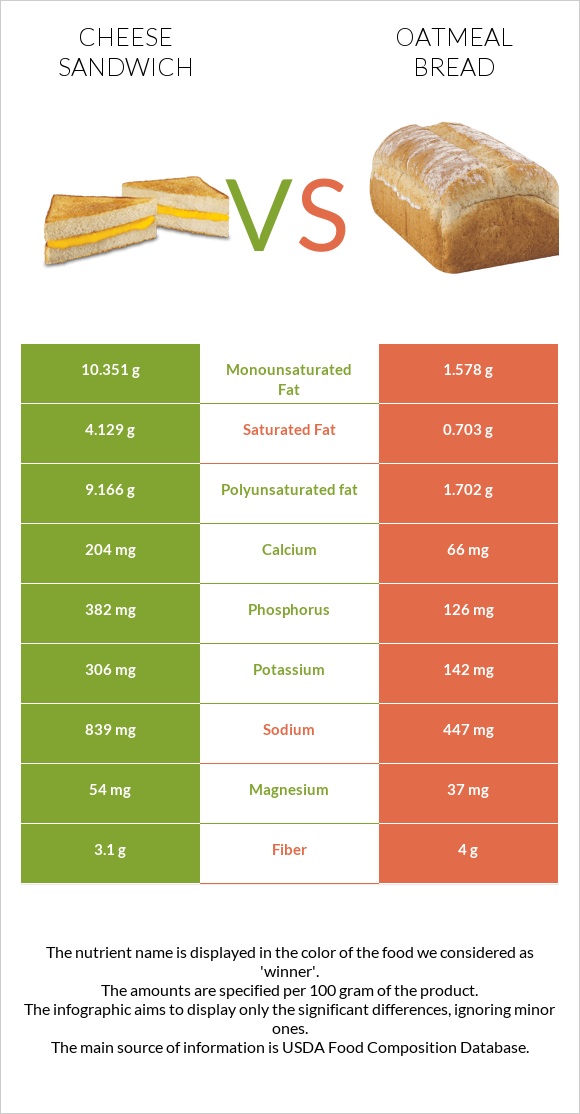Cheese sandwich vs. Oatmeal bread — In-Depth Nutrition Comparison
Compare
Important differences between cheese sandwich and oatmeal bread
- Cheese sandwich has more phosphorus, vitamin B6, vitamin B2, calcium, manganese, and vitamin B5; however, oatmeal bread has more copper.
- Cheese sandwich's daily need coverage for phosphorus is 37% more.
- Cheese sandwich has 6 times more saturated fat than oatmeal bread. Cheese sandwich has 4.129g of saturated fat, while oatmeal bread has 0.703g.
- Oatmeal bread has a higher glycemic index than cheese sandwich.
The food varieties used in the comparison are Crackers, wheat, sandwich, with cheese filling and Bread, oatmeal.
Infographic

Infographic link
Mineral Comparison
Mineral comparison score is based on the number of minerals by which one or the other food is richer. The "coverage" charts below show how much of the daily needs can be covered by 300 grams of the food.
| Contains more MagnesiumMagnesium | +45.9% |
| Contains more CalciumCalcium | +209.1% |
| Contains more PotassiumPotassium | +115.5% |
| Contains more PhosphorusPhosphorus | +203.2% |
| Contains more ManganeseManganese | +15.2% |
| Contains more CopperCopper | +30.6% |
| Contains more ZincZinc | +17.2% |
| Contains less SodiumSodium | -46.7% |
Vitamin Comparison
Vitamin comparison score is based on the number of vitamins by which one or the other food is richer. The "coverage" charts below show how much of the daily needs can be covered by 300 grams of the food.
| Contains more Vitamin CVitamin C | +∞% |
| Contains more Vitamin AVitamin A | +320% |
| Contains more Vitamin B2Vitamin B2 | +77.9% |
| Contains more Vitamin B5Vitamin B5 | +82.4% |
| Contains more Vitamin B6Vitamin B6 | +283.8% |
| Contains more Vitamin B12Vitamin B12 | +300% |
| Contains more Vitamin B1Vitamin B1 | +11.5% |
All nutrients comparison - raw data values
| Nutrient |  |
 |
DV% diff. |
| Polyunsaturated fat | 9.166g | 1.702g | 50% |
| Phosphorus | 382mg | 126mg | 37% |
| Fats | 25g | 4.4g | 32% |
| Monounsaturated fat | 10.351g | 1.578g | 22% |
| Sodium | 839mg | 447mg | 17% |
| Saturated fat | 4.129g | 0.703g | 16% |
| Vitamin B6 | 0.261mg | 0.068mg | 15% |
| Calcium | 204mg | 66mg | 14% |
| Vitamin B2 | 0.427mg | 0.24mg | 14% |
| Calories | 497kcal | 269kcal | 11% |
| Manganese | 1.083mg | 0.94mg | 6% |
| Vitamin B5 | 0.622mg | 0.341mg | 6% |
| Potassium | 306mg | 142mg | 5% |
| Copper | 0.16mg | 0.209mg | 5% |
| Magnesium | 54mg | 37mg | 4% |
| Fiber | 3.1g | 4g | 4% |
| Vitamin B12 | 0.12µg | 0.03µg | 4% |
| Protein | 9.8g | 8.4g | 3% |
| Carbs | 58.2g | 48.5g | 3% |
| Vitamin E | 0.48mg | 3% | |
| Vitamin B1 | 0.358mg | 0.399mg | 3% |
| Choline | 18.7mg | 3% | |
| Vitamin C | 1.5mg | 0mg | 2% |
| Cholesterol | 7mg | 0mg | 2% |
| Vitamin A | 21µg | 5µg | 2% |
| Iron | 2.62mg | 2.7mg | 1% |
| Zinc | 0.87mg | 1.02mg | 1% |
| Selenium | 24.3µg | 24.6µg | 1% |
| Vitamin K | 1.5µg | 1% | |
| Folate | 64µg | 62µg | 1% |
| Net carbs | 55.1g | 44.5g | N/A |
| Sugar | 8.14g | N/A | |
| Vitamin B3 | 3.185mg | 3.136mg | 0% |
| Tryptophan | 0.13mg | 0.116mg | 0% |
| Threonine | 0.298mg | 0.247mg | 0% |
| Isoleucine | 0.383mg | 0.325mg | 0% |
| Leucine | 0.698mg | 0.608mg | 0% |
| Lysine | 0.344mg | 0.27mg | 0% |
| Methionine | 0.167mg | 0.152mg | 0% |
| Phenylalanine | 0.472mg | 0.414mg | 0% |
| Valine | 0.438mg | 0.393mg | 0% |
| Histidine | 0.219mg | 0.186mg | 0% |
Macronutrient Comparison
Macronutrient breakdown side-by-side comparison
Protein:
9.8 g
Fats:
25 g
Carbs:
58.2 g
Water:
3.2 g
Other:
3.8 g
Protein:
8.4 g
Fats:
4.4 g
Carbs:
48.5 g
Water:
36.7 g
Other:
2 g
| Contains more ProteinProtein | +16.7% |
| Contains more FatsFats | +468.2% |
| Contains more CarbsCarbs | +20% |
| Contains more OtherOther | +90% |
| Contains more WaterWater | +1046.9% |
Fat Type Comparison
Fat type breakdown side-by-side comparison
Saturated fat:
Sat. Fat
4.129 g
Monounsaturated fat:
Mono. Fat
10.351 g
Polyunsaturated fat:
Poly. Fat
9.166 g
Saturated fat:
Sat. Fat
0.703 g
Monounsaturated fat:
Mono. Fat
1.578 g
Polyunsaturated fat:
Poly. Fat
1.702 g
| Contains more Mono. FatMonounsaturated fat | +556% |
| Contains more Poly. FatPolyunsaturated fat | +438.5% |
| Contains less Sat. FatSaturated fat | -83% |





